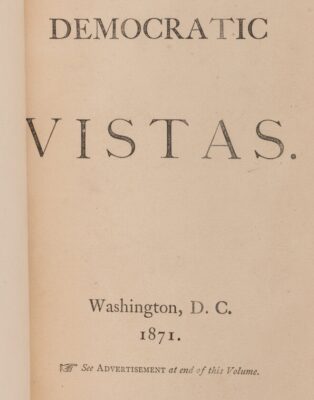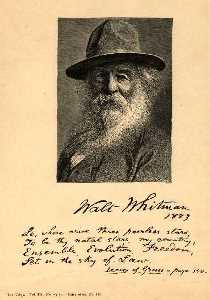“We are on the road to a destiny, a status, equivalent, in its real world, to that of the fabled damned.”

 Walt Whitman’s prophetic words from his 1871 essay Democratic Vistas resonate powerfully in the context of our present hectic and busy life in 2024. His assertion, “we are on the road to a destiny, a status, equivalent, in its real world, to that of the fabled damned,” can be interpreted as a forewarning about the potential perils of societal progress and industrialization. This statement, when examined against the backdrop of today’s fast-paced, technology-driven world, offers a poignant critique of our modern existence.
Walt Whitman’s prophetic words from his 1871 essay Democratic Vistas resonate powerfully in the context of our present hectic and busy life in 2024. His assertion, “we are on the road to a destiny, a status, equivalent, in its real world, to that of the fabled damned,” can be interpreted as a forewarning about the potential perils of societal progress and industrialization. This statement, when examined against the backdrop of today’s fast-paced, technology-driven world, offers a poignant critique of our modern existence.
Whitman wrote Democratic Vistas during a time of great transformation in America. The nation was experiencing rapid industrialization, urbanization, and social upheaval. Whitman, a poet deeply concerned with the spiritual and democratic fabric of society, saw these changes as double-edged swords. While he recognized the potential for progress and growth, he also feared the loss of individual and collective humanity. His metaphor of a “destiny…equivalent…to that of the fabled damned” suggests a future where the very advancements that promise liberation and prosperity might lead to moral and existential despair.
Fast forward to 2024, and Whitman’s concerns seem eerily prescient. Our lives are dominated by technology and connectivity, yet this constant state of being “plugged in” has often led to a paradoxical sense of isolation. The relentless pursuit of productivity, efficiency, and success has created a culture where time is perpetually scarce, and mental well-being is frequently compromised. In a world where work follows us home through emails and notifications, and social media fosters a continuous comparison of lifestyles, the pressure to keep up can feel overwhelming.
The modern equivalent of Whitman’s “fabled damned” could be seen in the growing rates of anxiety, depression, and burnout. Our pursuit of technological and economic advancement has brought undeniable benefits, but it has also come at a significant cost. The relentless pace of modern life leaves little room for the introspection, connection, and creativity that Whitman championed. The poet’s vision of a democratic society rich in cultural and spiritual fulfillment seems at odds with the frenetic, often superficial reality many people experience today.
Moreover, the societal fragmentation Whitman feared is evident in the deep political and ideological divides of our time. The digital age, while connecting us globally, has also enabled the proliferation of misinformation and the echo chamber effect, where individuals are increasingly exposed only to viewpoints that reinforce their own. This has led to a polarized society where meaningful, democratic dialogue is harder to achieve.
However, Whitman’s vision was not without hope. He believed in the potential for America to achieve a true democratic society, one that valued individual worth and collective progress. In our present day, this vision can still serve as a guiding light. There is a growing recognition of the need for balance—between work and life, technology and nature, progress and preservation. Movements advocating for mental health awareness, digital detox, and sustainable living reflect a collective yearning for a more holistic and humane way of life.
In conclusion, Walt Whitman’s words from Democratic Vistas offer a sobering reflection on our modern existence. They challenge us to critically evaluate the trajectory of our societal progress and remind us of the importance of nurturing our spiritual and democratic values amidst the whirlwind of contemporary life. As we navigate the complexities of 2024, Whitman’s insights encourage us to seek a path that harmonizes technological and economic advancements with the timeless quest for meaning, connection, and true fulfillment.
Beezone